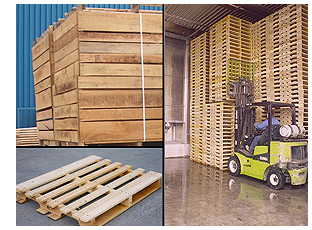ISPM 15 exemption to be removed between Canada and USA
Canada and the United States are in the process of reviewing a proposed amendment that would remove the exemption of ISPM 15 for shipping wood packaging materials between the two countries. Since December 2010, both countries have been looking into regulating wood packaging materials (WPM) crossing one another's border in the same manner as wood packaging material entering from other countries.
Canada and the US are working together to develop a synchronized timeline for the implementation of the suggested changes with a complete implementation going into effect in 2012.
Essentially, what this means is that all Canadian and American companies that ship wood packaging materials across each other's border will soon be required to use heat treated pallets and crates.
ISPM 15
The International Standard for Phytosanitary Measures (ISPM) No. 15 Regulation of wood packaging material (e.g.: wooden pallets, wood crates, etc.) used in the transportation of goods and merchandise in international trade is enforced by many countries to prevent the transmission of pests (e.g.: Formosan termites, Emerald Ash Borers).
2005
In 2005, Canada and the United States put into practice import requirements for wood packaging materials that were consistent with ISPM No. 15, but both countries agreed to not implement these requirements for wood packaging material moving between Canada and United States with a Canadian or United States origin.

Review shipping rules for CDN - US
Upon reviewing the pest-risks that are linked to wood packaging materials; both countries have decided that by reinforcing the ISPM 15 standard for wood packaging moving between Canada and the US, many logistical and pest risks would be resolved. (e.g.: minimize the transmission of pests that are present in one country; increase regulatory control of the non-compliant WPM that originates in a third country).
Timeline
The Canadian and US controllers understand the implications associated to introducing the ISPM 15 requirements into the shipping process; from added costs and time required to deplete existing wood packaging material inventories to setting up the necessary wood packaging material manufacturing procedures. For this reason, the two sides have opted to set up a coordinated implementation to slowly introduce the ISPM No. 15 requirements.
A date when full implementation will be required has not yet been established, although it is expected to be as soon as the summer of 2012. Likely by the Spring of 2011, the final guideline for the Canadian policies and the United States final rulings should be published and the two countries will begin to enforce a period of "informed compliance"; any wood packaging material that are found to not be compliant, will be allowed to continue onto its destination, barring any pests are found in the wood crate or shipping pallet. (Should any pests be detected, actions to sanitize the wood pallets or shipping crates will be enforce, such as requiring heat treatment or, simply refusing entry of the shipment to the country. Carriers in question will be informed that all shipments will need to comply to ISPM 15 regulations when full implementation takes place.
Once the full implementation takes place, any wood packaging material that does not meet the requirements will not be allowed to enter the country of destination. If pests are found in the shipment, the importing country will be required to treat the shipment before returning it to the country of origin. The carrier responsible for the shipping pallet or wood crate in question will incur all costs.
Heat treated pallets and wood crates
The ISPM No. 15 requirements oblige that wood that is used to manufacture wood packaging material for export or the export wood packaging material itself (eg: wood shipping pallets, wood crates...) must be heated so that the materials achieve a minimum temperature of 56°C (132.8° F) throughout the profile of the wood (including at its core) for a minimum of 30 minutes.
L.C.N. inc. was the first North American wooden pallets manufacturer to offer heat treated wooden pallets. At L.C.N. inc., we guarantee that our heat treated pallets and wood crates meet the strictest cleanliness and sterilization standards as required by the food and pharmaceutical industries. Visit us at L.C.N.
http://www.inspection.gc.ca/english/plaveg/protect/dir/d-01-05e.shtml#a1
http://www.inspection.gc.ca/english/plaveg/for/wopae.shtml